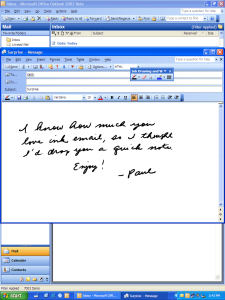
As an example of how long patent battles can linger, a federal jury in San Diego has ruled Microsoft must pay Alcatel-Lucent some $70 million in damages for infringing on data-entry patents in a case that dates all the way back to 2003. The patents in question involve keyboard-free data entry technologies Microsoft used in products like Windows Mobile, MS Money, and its Outlook email client. Lucent originally sued Dell and Gateway over the issue; Microsoft stepped in as the plaintiff, since the suit was really about Microsoft technology and the company felt obligated to protect its licensees.
The patents were originally granted to AT&T; they transferred to Lucent when the company spun out of AT&T, and become part of Altatel-Lucent’s portfolio when the companies merged in 2006.
The new ruling represents the results of Microsoft’s appeal of an earlier verdict that came with a $500 million damages award. A federal appeals court vacated that award in 2009, saying that Microsoft should have to pay damages approximately equal to what it would have had to pay to license the technologies in the first place, since the functionality was a comparatively minor feature to Microsoft products.
The new $70 million ruling reflects the recalculated damages.
In a statement, Microsoft indicated it is pleased with the ruling, but will consider its next move with an eye towards potentially getting the damages reward reduced further.
The initial verdict that Microsoft had infringed on the patents is undisputed, and was supported by significant evidence.
The case is one of a series of suits Lucent brought against Microsoft over MP3 audio technology (Microsoft eventually prevailed), identifying users on a telephone networks (Alcatel-Lucent won), and speech compression and communications (which more-or-less ended in a draw).

